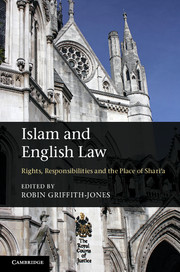Book contents
- Frontmatter
- Contents
- List of contributors
- List of abbreviations
- Preface
- Introduction
- Part I The Archbishop of Canterbury and shariʽa law
- Part II The Archbishop’s proposal for ‘transformative accommodation’
- Shariʽa and secular democracy: is Islamic law compatible with the European Convention on Human Rights?
- 3 The Refah case at the European Court of Human Rights
- 4 The compatibility of an Islamic/shariʽa law system or shariʽa rules with the European Convention on Human Rights
- 5 An analysis of the relationship between shariʽa and secular democracy and the compatibility of Islamic law with the European Convention on Human Rights
- 6 Dignity and religion
- Legal pluralism: should English law give greater recognition to Islamic law?
- Accommodation or conflict: trajectories in the United Kingdom
- Part III Responsibilities and rights
- Part IV Prospect: equality before God and before the law
- Select bibliography
- Index of cases
- Index
- References
5 - An analysis of the relationship between shariʽa and secular democracy and the compatibility of Islamic law with the European Convention on Human Rights
Published online by Cambridge University Press: 05 April 2013
- Frontmatter
- Contents
- List of contributors
- List of abbreviations
- Preface
- Introduction
- Part I The Archbishop of Canterbury and shariʽa law
- Part II The Archbishop’s proposal for ‘transformative accommodation’
- Shariʽa and secular democracy: is Islamic law compatible with the European Convention on Human Rights?
- 3 The Refah case at the European Court of Human Rights
- 4 The compatibility of an Islamic/shariʽa law system or shariʽa rules with the European Convention on Human Rights
- 5 An analysis of the relationship between shariʽa and secular democracy and the compatibility of Islamic law with the European Convention on Human Rights
- 6 Dignity and religion
- Legal pluralism: should English law give greater recognition to Islamic law?
- Accommodation or conflict: trajectories in the United Kingdom
- Part III Responsibilities and rights
- Part IV Prospect: equality before God and before the law
- Select bibliography
- Index of cases
- Index
- References
Summary
Introduction
The relationship between shariʽa and secular democracy, with the question whether Islamic law is compatible with the European Convention on Human Rights (ECHR), is far more complex than sensational media reports would suggest. In the present context we are asking whether formal recognition of (aspects of) shariʽa/Islamic law as part of the laws of the UK, in any form, would be repugnant to the country’s ‘secular’ democratic system or would create problems in respect of its international obligations under the ECHR. We must ask as well, more generally, whether or not shariʽa/Islamic law and democracy/human rights are or can be compatible or can coexist at all. The pragmatic answer to both questions has to be, ‘Yes’ and ‘No’.
Beyond the question of compatibility
In such discussions in the West, it is the shariʽa or Islamic law that is usually put on the defensive and characterised narrowly as an archaic, imprecise and unchanging legal system that is stuck in the past and consisting only of women’s oppression and of such punishments as flogging, amputation and stoning. However, it is doubtful whether Muslims in Europe are actually asking for the application of traditional Islamic criminal law (which is not currently applied even in most Muslim majority states that recognise shariʽa or Islamic law as part of their legal systems). The argument is rather for a formal recognition of the shariʽa relating to Islamic personal law in ʽaspects of marital law, the regulation of financial transactions and authorised structures of mediation and conflict resolution’ as indicated by Rowan Williams, then Archbishop of Canterbury, in his lecture.
- Type
- Chapter
- Information
- Islam and English LawRights, Responsibilities and the Place of Shari'a, pp. 72 - 93Publisher: Cambridge University PressPrint publication year: 2013
References
- 2
- Cited by

